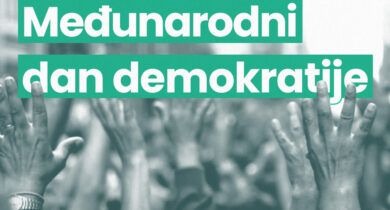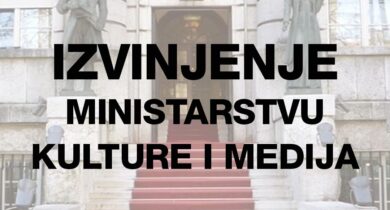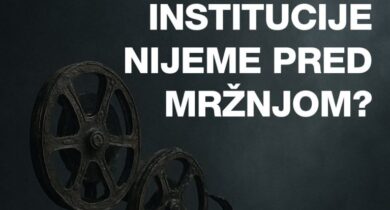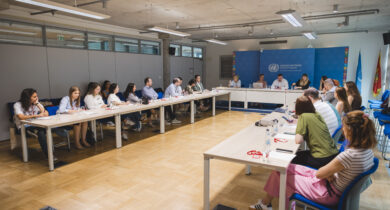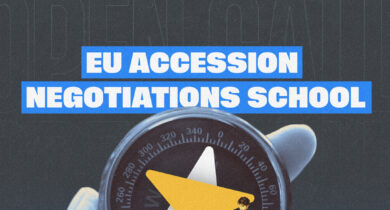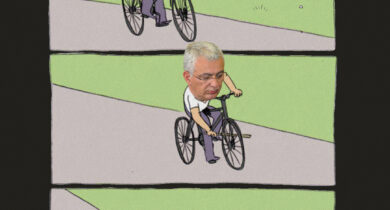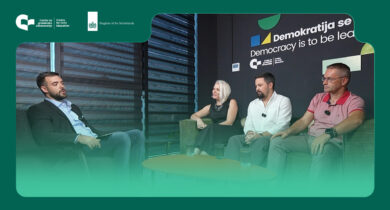On the eve of the International Day of Democracy, marked on 15 September, the Centre for Civic Education (CCE) highlights the growing gap between Montenegro’s formal progress in the EU integration process and the actual state of development and implementation of democratic standards. Unfortunately, we witness daily poor indicators in the field of fundamental human… »
Actual
Public officials must not endanger the safety of environmental activists
Non-governmental organizations and civic activists strongly condemn the threat made by Milan Knežević, a member of parliament from the ruling party, the Democratic People’s Party, directed at environmental activist Aleksandar Dragićević. During a protest against the construction of a wastewater treatment plant in Botun, Knežević addressed the following statement to activist Dragićević: “If he continues… »
Apology to the Ministry of Culture and Media
We apologize to the Ministry of Culture and Media for listing them among state institutions that failed to respond to the violent interruption of the screening of the film “Stork”. It was our mistake not to notice their reaction, along with those of the Cinematheque and the Film Center, and to group them together with… »
Are Institutions Silent in the Face of Hatred?
Non-governmental organizations and civil activists are calling on the State Prosecutor’s Office and the Police Administration to immediately inform the public about the course of the investigation in the case of the violent disruption of the film screening “Stork”. It has already been seven days since hooligans interrupted the screening of Isa Ćosja’s film as… »
It is time for civic education to become mandatory
Civic education as a compulsory subject should become a stronger tool for fostering democratic culture, critical thinking, and active citizenship among young people, was the key message from the roundtable organized today in Podgorica by the Centre for Civic Education (CCE), in partnership with Human Rights Action (HRA) and the Centre for Women and Peace… »
Call for the participants for the EU Accession Negotiations School
Centre for Civic Education (CCE) announces a CALL FOR PARTICIPANTS for the EU ACCESSION NEGOTIATIONS SCHOOL The EU Accession Negotiations School is a unique educational programme that opens the door to the world of European integration for youth, activists, students, researchers, journalists, and young professionals. The programme is designed to provide a broad range of… »
NGOs call on the EU to engage regarding the implementation of media laws and the appointment of members to the Council of the Agency for Audiovisual Media Services
Media-focused NGOs submitted an appeal today to the Delegation of the European Union, urging its engagement in the implementation of media laws and the appointment of members to the Council of the Agency for Audiovisual Media Services (AVMS). Specifically, the NGOs called on the Head of the EU Delegation, Johan Sattler, to remind Montenegrin authorities… »
Security guards must be returned to schools immediately – children’s safety is not an issue to be postponed
The non-governmental organizations – Parents’ Association, Human Rights Action (HRA), and the Centre for Civic Education (CCE) – today sent a letter to the Ministry of Education, Science and Innovation, requesting an urgent public statement on whether the engagement of security guards in primary and secondary schools will continue during the 2025/2026 school year. This… »
Mandić and the Parliamentary Majority Obstruct Media Reforms – Montenegro’s EU Path at Risk
Non-governmental organizations active in the media sector submitted an initiative today to the President of the Parliament of Montenegro, urging him to contribute to the implementation of media laws and the appointment of members to the Council of the Agency for Audiovisual Media Services (AVMS). The NGOs, engaged in media-related issues, called on the President… »
RTCG and AVM Between Public Interest and Political Calculations
The independence of Radio and Television of Montenegro (RTCG), local public broadcasters, and the Agency for Audiovisual Media Services (AVM) is essential for safeguarding the public interest, yet political pressures continue to hinder their functioning. This was one of the conclusions of the PRODUCAST by the Centre for Civic Education (CCE), focusing on the media… »

